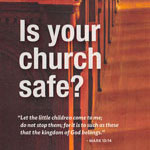Creating Policies
The Book of Order provides that all councils of the PCUSA should have sexual abuse policies and child and youth protection policies (G-3.0106). Under the Create Policies button you will find information concerning how your council can create policies.
You can also find a helpful, free resource, the abuse prevention policy template, a resource on the SafeConduct Workbench of the Insurance Board. This template can be a tool to help your council create or update your policies. This resource is free to all PC(USA) councils.
Background and Reference Checks
One step in prevention and a best practice is to perform criminal background checks and reference checks on all council staff and volunteers who work and will work with minors. This includes checks for regular day-to-day work (ex. Christian education, children’s choirs, meetings), as well as intermittent or special events (ex. conferences, monthly or annual meetings).
Training/Awareness
 “The goals of training are to ensure that staff and volunteers who work with children understand the nature of child abuse and how to respond if it becomes apparent that a child has been abused. Training is also useful in reviewing and modifying the church policy, as volunteers who have had experience working with the policy share their experience.” (We Won’t Let It Happen Here, page 20).
“The goals of training are to ensure that staff and volunteers who work with children understand the nature of child abuse and how to respond if it becomes apparent that a child has been abused. Training is also useful in reviewing and modifying the church policy, as volunteers who have had experience working with the policy share their experience.” (We Won’t Let It Happen Here, page 20).
Awareness is the key to the prevention of sexual misconduct. When awareness is raised, persons are often able to spot and stop inappropriate conduct before it harms others.
Having a policy is important, but it is of little value of staff and volunteers are not trained at least annually on policy and procedures.
Resources for raising awareness
Is Nothing Sacred? A timely case study, designed for congregations for preventing and finding effective solutions for sexual abuse against congregants by clergy, by the Rev. Marie M. Fortune (Cleveland: The United Church Press, 1999).
A Sacred Trust: Boundary Issues for Clergy and Spiritual Teachers. A program of four training videos that increase awareness of the need for healthy boundaries in the clergy-congregant or student-teacher relationship. Available through the Faith Trust Institute.
Annotated Bibliography of Clergy Sexual Abuse. The phenomenon of sexual abuse as committed by persons in fiduciary relationships is widespread among helping professions. Those who perpetrate these violations are not confined to any nation. This bibliography is oriented to several specific contexts in which this phenomenon occurs. By James S. Evinger. Available through the Faith Trust Institute.
Develop a training program
Annual training sessions are one way to raise the awareness of both staff and volunteers. Components should include: review of the ministry’s sexual misconduct policy, recognizing the signs and symptoms of abuse, maintaining healthy boundaries, appropriate use of technology and reporting of suspected abuse. Someone who is familiar with sexual misconduct prevention practices should lead the training sessions. If there is no one in your ministry with this expertise, then contact your presbytery.
The training should be biblically based, using Scripture to remind participants of God’s call for justice and compassion. Relevant passages include (but are not limited to) Exodus 22:21-23, Micah 6:8, Psalm 77:1-2, Amos 5:24 and Matthew 19:14.
Be aware of prevention techniques
There are several guidelines that will enhance the atmosphere of prevention. Some of these are:
Require teachers/leaders to work in pairs.
Know and maintain appropriate personal boundaries.
Have written policies and procedures in place.
Use both background and reference checks for staff and volunteers.
Physical plant (such as windows in doors, bathroom policies, communication between child care and parents)
Consider healthy body education
Find additional resources
- Safe Ministries Helpful Resources
- SafeConduct™ Workbench provides tools to help you develop and participate in your ministry’s abuse prevention program. Learn more.
